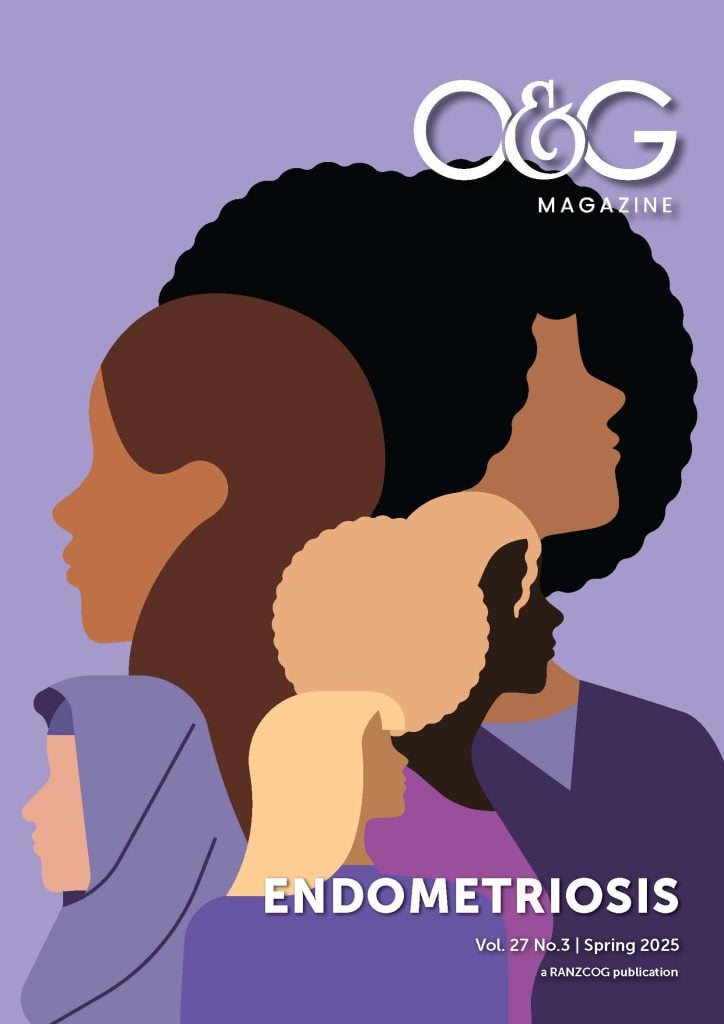President’s Introduction to the Advocacy Report
Advocacy in Action
I write not only as a clinician, nor solely as the President of RANZCOG, but as a passionate advocate for change—toward a future in which every woman, regardless of her postcode, ethnicity, or income, receives the care she deserves.
RANZCOG has firmly established itself as a leading voice in advocacy for women’s health. In a climate marked by critical workforce shortages, growing clinical complexity, and entrenched systemic barriers that continue to delay or deny care, our mission is more urgent than ever.
To all of you—our Fellows, trainees, and members—thank you. Your daily commitment to prioritising women’s health, often under immense pressure, exemplifies the College’s unwavering dedication to delivering high-quality, compassionate care.
We must continue to demand a system that listens—truly listens—to women and clinicians alike, values lived experience, and delivers timely, culturally safe, and equitable care.
This year, the College has made over 180 formal submissions—an extraordinary effort that reflects our active role in shaping policies that affect our profession and our patients. I acknowledge the expertise and time generously contributed by our members, trainees, consumers, and staff. Your work ensures that the College remains a visible and respected voice in policy conversations.
In Aotearoa New Zealand, we’ve made significant strides. From partnering with Te Whatu Ora to contributing clinical insights across national forums, RANZCOG continues to advocate strongly for improved health outcomes for women and whānau.
As clinicians, our voices matter—and we must keep raising them. We need more than rhetoric from decision-makers. We need long-term investment, a strategic approach to workforce planning, and bold, sustained action on health equity.
As my presidency draws to a close, I reflect with pride on how far we’ve come. The following advocacy report in this issue of O&G Magazine is a testament to what we can achieve when we unite around a shared purpose.
Thank you for walking alongside me—and for everything you do to champion women’s health.
Advancing Women’s Health: RANZCOG’s Advocacy Priorities Throughout Winter 2025
The College has maintained a robust advocacy agenda throughout 2025, addressing critical challenges. As the healthcare sector navigates ongoing workforce pressures, funding constraints, and access issues, the College has continued to focus on four priority areas: specialist health workforce, sexual and reproductive health, the financial crisis in private practice, and shortages of medicines and devices. In addition, the College’s advocacy for better endometriosis care is starting to bear fruit.
Specialist Health Workforce: Building Capacity
Health workforce remains a pressing issue and advocating for the support of the O&G specialist workforce is at the forefront of RANZCOG’s efforts.
The College’s pursuit of funding for the Obstetrics and Gynaecology Education and Training Program (OGET) has encountered setbacks at the federal level, with pre-budget submissions proving unsuccessful. The project has been granted an extension to continue within the current funding stream. However, RANZCOG has pivoted to pursue state-based funding whilst maintaining focus on gaining federal support in the long-term. This dual approach reflects the urgency to expand training pathways, given the geographic necessity for training in rural and regional centres, and the success of the OGET program.
Workforce challenges have been highlighted during on-the-ground site visits, including Logan and Toowoomba Hospital in Queensland, Wagga Wagga Base Hospital and Albury Wodonga Women’s Health Services. Recurring themes emerged around burnout, skills maintenance challenges, and the need for better accommodation support for trainees undertaking regional rotations. These visits have informed the College’s advocacy for workforce solutions that address both recruitment and retention.
The College’s participation in the National Maternity Workforce Strategy consultation forums has provided opportunities to influence national policy direction. RANZCOG has continued to push for increased representation on the Steering Committee, while also continuing to participate in this work through other avenues.
In Aotearoa New Zealand, similar workforce pressures exist; shortages and wellbeing of specialists, as well as plans for surgical training outsourcing. The College’s trans-Tasman structure recognises the shared nature of these challenges while advocating for solutions tailored to each country’s specific healthcare system.
Sexual and Reproductive Health: Expanding Access
RANZCOG’s advocacy in sexual and reproductive health has focused on both legislative and practical reform. The College’s support for the NSW Abortion Law Reform Amendment (Health Care Access) Bill 2025 exemplifies this dual approach. Through extensive engagement with over 100 NSW MPs, RANZCOG successfully advocated for expanded prescribing rights for MS 2-Step to nurse practitioners and endorsed midwives.
Although the original bill underwent significant revision, with provisions for effective referral pathways and reasonable distance requirements removed, the passage of expanded prescribing rights represents meaningful progress.
RANZCOG also participated in the early stages of development of a national sexual and reproductive health data monitoring framework by the Australian Institute of Health and Welfare. This multi-year project will provide the evidence base for future policy advocacy and service planning. Data on sexual and reproductive health is known to be insufficient.
Private Practice Crisis: Under Pressure
The financial crisis in private obstetrics and gynaecology has intensified, culminating in the entry of Healthscope into receivership in late May 2025. This has created uncertainty for thousands of patients at the 37 Healthscope hospitals and highlighted the systemic issues facing private maternity care.
RANZCOG’s opposition to Private Healthcare Australia’s bundled maternity care payment model released in the autumn has been unwavering, with significant member engagement in consultation processes uniformly opposing the proposal. The College’s strategic response has involved collaboration with allied organisations including the National Association of Specialist Obstetricians and Gynaecologists (NASOG), Avant, and the Australian Medical Association to present a united front against policies that could further destabilise private practice viability.
The College’s engagement with federal officials has focused on securing representation in policy development processes. Despite the Private Hospital Sector Financial Health Check identifying private obstetrics as one of two ‘services under particular pressure’, RANZCOG has been excluded from the Minister’s Private Health CEO Forum. The College continues to meet with the Department on this point.
The broader implications extend beyond individual provider concerns to encompass patient choice and public system capacity. As private maternity units close or reduce services, pressure on the public system will increase at a time when capacity constraints are already significant. RANZCOG’s advocacy has emphasised this system-wide impact while calling for comprehensive policy responses that recognise the interdependence of public and private health care.
Medicines and Devices: Ensuring Essential Supplies
Ongoing shortages of essential medicines and devices have required sustained advocacy. RANZCOG’s advocacy with the Pharmaceutical Benefits Advisory Committee (PBAC) and Therapeutic Goods Administration (TGA) has focused on both immediate shortage responses and longer-term supply security measures.
The TGA’s medicines repurposing program presents opportunities to support older, off-label medications that are highly effective in pregnancy but face commercial viability challenges in the Australian market. RANZCOG’s engagement with this program reflects the College’s proactive approach to identifying policy mechanisms that can address supply challenges while maintaining clinical effectiveness. Despite making applications to this program in the past, the College has had limited success in having specific medicines ‘repurposed’, but this has provided a platform for RANZCOG to continue pushing for refinements in the program. The College has established a closer ongoing dialogue with the TGA and Department of Health, Disability and Ageing which has been useful in pushing for advancements in public system support for medications in sexual and reproductive health and pregnancy.
Endometriosis Care Makes Advances
As a final point, it is valuable to call attention to the results of persistent College advocacy in the area of endometriosis care, spotlighting some tangible policy and funding improvements that are working their way into the Australian health care system.
First, on 1 July 2025, two new items were added to the MBS that to support longer specialist gynaecological consultations of 45 minutes or more. Funded in the May 2024 budget, these items will support complex gynaecological presentations, including persistent pelvic pain and endometriosis. These items are a result of College advocacy leading into last year’s federal budget, and RANZCOG has continued to work collaboratively with the government to ensure they include clinician input and best address longstanding inequities in the MBS.
Second, the federal budget presented in March 2025 continued to show investments in women’s health through the addition of funding to establish dedicated endometriosis clinics across the country. New funding has been allocated to open 11 new clinics and extend services at the existing 22.
Finally, the publication of the College’s “Australian Living Evidence Guideline: Endometriosis” launched in May 2025 will marry best clinical practice advice with these substantial advocacy wins to deliver the best quality care possible.
Looking Forward: Advocacy Priorities for Spring
As we move into spring 2025, RANZCOG’s advocacy priorities remain focused on these critical areas while adapting to evolving policy landscapes. Success will ultimately depend on sustained engagement across all levels of government, continued collaboration with allied organisations, and the ongoing commitment of RANZCOG members to translating policy advocacy into improved patient care outcomes across Australia and Aotearoa New Zealand.






Leave a Reply